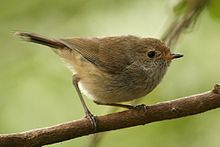Australian warblers
| Acanthizidae | |
|---|---|
 |
|
| Brown thornbill (Acanthiza pusilla) | |
| Scientific classification | |
| Kingdom: | Animalia |
| Phylum: | Chordata |
| Class: | Aves |
| Order: | Passeriformes |
| Suborder: | Passeri |
| Superfamily: | Meliphagoidea |
| Family: |
Acanthizidae Sundevall, 1872 |
| Genera | |
|
14, see list |
|
14, see list
The Acanthizidae, also known as the Australasian warblers, are a family of passerine birds which include gerygones, thornbills, and scrubwrens. The Acanthizidae consists of small to medium passerine birds, with a total length varying between 8 and 19 centimetres (3.1 and 7.5 in). They have short rounded wings, slender bills, long legs, and a short tail. Most species have olive, grey, or brown plumage, although some have patches of a brighter yellow. The smallest species of acanthizid, and indeed the smallest Australian passerine, is the weebill, the largest is the pilotbird.
Following the Sibley-Ahlquist taxonomy (1990) they were previously regarded as subfamily Acanthizinae within the Pardalotidae family. However, current revisions (Christidis & Boles, 1994; Schodde & Mason 1999) don't support this arrangement. The Dasyornithidae (which include the bristlebirds) are variously seen either as subfamily Dasyornithinae within the Acanthizidae or Pardalotidae family or as own family (Schodde & Mason 1999).
The Acanthizidae family consists of the two subfamilies Sericornithinae and Acanthizinae (Schodde & Mason 1999), 14 genera, 63 species and 196 taxa.
Family Acanthizidae
Acanthizids are native to Australia, Indonesia, New Zealand, and the south-west Pacific. Most species are found in Australia and New Guinea, with Australia having thirty-five endemic species and New Guinea fifteen. A single species is found in Vanuatu, New Caledonia and the Solomon Islands, and three species occur in the New Zealand region, including endemic species in the Chatham Islands and Norfolk Island. In Asia two species are restricted to Indonesia and another is found in the Philippines and on mainland Asia. Most species are sedentary, with the exception of the gerygones. The family occupies a range of habitats from rainforests to arid deserts.
...
Wikipedia
